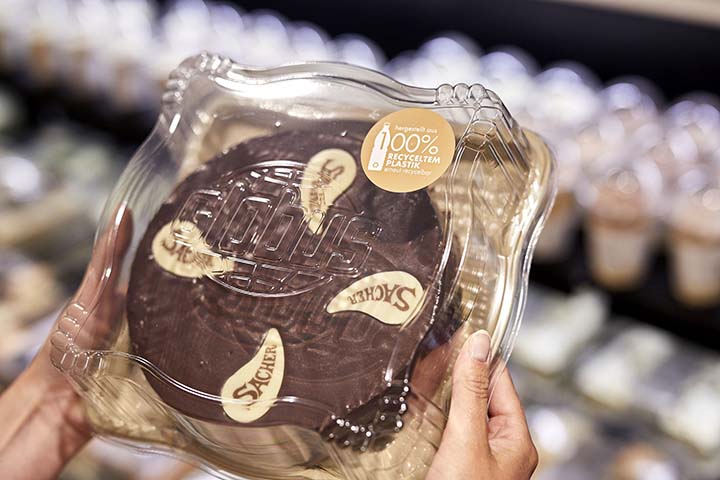
Against the backdrop of climate protection discussions, the Globus retail group relies on recyclable or recycled packaging materials for its own products. Plastic is being saved, but not completely banned. Globus bakeries have also made the switch.
Globus uses blister packaging made from recycled plastic for cakes
Around 80% of the fresh bakery and confectionery products produced in Globus bakeries arrive packaged on the shelves of the retail group. The topic of packaging is therefore relevant for scratch bakeries. The packaging for cheesecakes, sand cakes and donuts has been rethought. Instead of plastic, they are made of two materials: cardboard and a plastic viewing window. The consumer can detach both from each other after use and dispose of them separately (waste paper, plastic waste).
Recyclability is important, but so is customer benefit. Globus, therefore, did not want to do without the plastic viewing window. “Test phases have shown that our customers want to see the goods,” says Alexander Heinrich, who manages the bakeries at Globus. The packaging changeover saves the company around 600,000 plastic packages a year for donuts alone. That corresponds to about 40 tons of plastic.
Different foods, different demands
Even though plastic is not a renewable resource like paper, it has advantages in terms of hygiene and product protection. Globus finds that plastics are better than their reputation. Alexander Heinrich: “Different foods have different requirements. Oily, greasy and moist foods have to be packaged in such a way that they are transportable, food-safe and suitable for storage. For this reason, it is not advisable to completely avoid plastic packaging.” It depends on the type of plastic and the subsequent recycling process, he said. “Instead of black plastic, we now go for ivory plastic. This is more recyclable, can be better recognized by sorting plants at recycling companies and consists of recyclate. So the plastic has gone through at least one stage of life before being shaped into our ivory packaging through recycling.”
At the same time, Alexander Heinrich points out that the new packaging concept ensures that recyclates are only used if it can be guaranteed that no harm will come to the food. “Our Clear Cups, for example, are made predominantly of recyclate but have a proportion of 20% virgin plastic mixed in for the benefit of elasticity and the food.” Fresh plastic serves as a barrier between the recyclate and the food, at least in the case of moist, greasy or oily products.

Customers question more
Customer attitudes towards packaging have changed, according to the experience of the bakery boss. “Customers are questioning a company’s actions more and more; for this reason, we are interested in optimizing our processes not only for environmental reasons, but also to show our customers that we are doing our bit for the circular economy and sustainability.” He continued, “The pandemic has increased environmental awareness and health awareness not only in the direction of nutrition, but also in other directions, such as packaging alternatives.” Customers are even more interested in the topic than before and are looking for information, he said. Therefore, Globus communicates the advantages and disadvantages of the different materials to the customers. Heinrich: “Customers should be able to transparently see why we have chosen which type of packaging and understand how it can be fed into the recycling cycle.” Globus communicates the what and the how via the homepage and information on the packaging itself.
As a rule, the production of packaging with recycled raw materials is somewhat more expensive. According to its own statements, the retail group has been able to remain at the same purchase price level for many packages through optimizations. Additional costs would not be passed on to the customers.
The Recyclate Forum
Globus has been a member of the Recyclate Forum since 2018. Retailers, consumer goods manufacturers, packaging suppliers and waste disposal companies have joined forces in the initiative to promote consumer awareness of a circular economy for packaging, to achieve sorting of recyclable materials, to promote the recycling of plastics and to use more recycled plastics. In addition, the forum aims to reduce packaging and to ensure that new packaging is recyclable in the production process so that it remains a resource in the cycle. The initiative now has 47 members.

Raw material delivery in reusable containers
Besides the change in packaging, something else has changed. Some raw materials now reach the bakery in reusable containers. “Both our suppliers and our employees have responded very positively to this,” reports Alexander Heinrich. “Reusable containers not only reduce packaging waste but are also easier to handle.”
At the central production facility in Bingen, Globus uses 400- and 600-liter containers for cooking oil and 500-liter containers for eggs. The company has also switched to reusable containers for fruit fillings. As soon as a container is emptied, it is stored in a separate room. Collection and cleaning are handled by the suppliers.

The bakers and confectioners produce around 200 different items on-site every day


